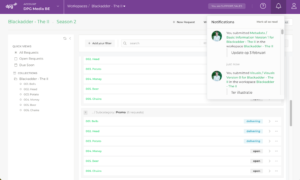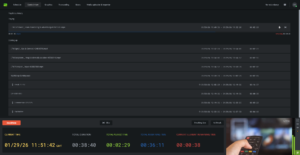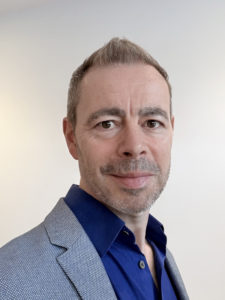Postudio – Driving new talent and inclusivity in post-production

Harish Prabhu, Founder, Postudio
Back in the 80s as a young boy, I witnessed what was the prevalent Business Model of the era – The Manufacturer Model – i.e. when necessity was the mother of invention. Busier families with less cooking time needed Instant noodles, pagers (yes, those antiquated things) when you needed to be reached urgently, Sony Walkman because you needed music when you walked/ exercised or were on long flights.
As we grew up, the insight reversed – invention drove necessity. Did I need transport on demand, grocery on demand, pretty much everything on demand? I’m not sure any consumer asked for Uber or felt they needed it. But here we are – Brands like Uber, Doordash, Deliveroo, and TaskRabbit are ‘necessities’ in today’s digital age.
One Industry that didn’t make this transition was the post-production industry. Till 2020 it worked exactly as it had in the 90s with a few hardware improvements and supply management interventions. The core work of Shoot > Upload > Edit in studios, storage on external devices, and a final, physical delivery pretty much stayed constant.
It was during Covid that we realized how antiquated the post-production industry actually was. With everyone in enforced homestays, we had to scramble to get bulky machines transported to far-flung editor homes all across Mumbai and figure out every possible communication and collaboration app like Dropbox, Google Cloud, Zoom, and then some just to try and carry on the basic work of Brief, Edit, Review, Storage and Dissemination. We compromised security, creative freedom, and peace of mind.
At this point, necessity once again became the mother of invention and the pandemic accelerated the need to upgrade the industry to the digital age and let every stakeholder enjoy the ‘freedom’ that this will entail. Because ultimately, whether necessity leads to invention or vice versa, the final outcome is ‘freedom of choice’ for the user.
At Postudio, we aimed for the stars: unprecedented creative freedom for every stakeholder on every front. Lockdown was a mess for the post-production space, it was a logistical nightmare, the collaboration was chaotic, and the whole process became frustrating. A realization dawned then that the industry is broken and has been for a long time. There were too many dependencies, and the workflow was not remote enough for the remote work era. There was not enough freedom. The limitations of the industry had been forcing people to work generally from one office or one building, which made them look for talent in the same city or relocate them there. All of this had to change, and I wanted to bring about that change.

In 2022, we worked with a production company, Creative Stew, that was making a docuseries in Singapore but wanted to work with people from several other regions. The wary producers wanted to avoid another lockdown situation and so decided to spread out their team to avoid any restrictions of a similar nature. They worked from five countries (and eight regions): Singapore, London, Thailand, Malaysia, and India (Mumbai, Kochi, Hyderabad, and Chennai). The production team would shoot in Singapore every day and upload dailies, so the editors from other regions could start previewing the footage and start creating. A few years ago, any producer would’ve preferred to avoid that undertaking. They’d rather choose to onboard a team from the same geographical region. The challenges of a diverse team, sitting in geographically distant locations would’ve been overwhelming. The answer is in the technology.
I have been part of this industry for nearly three decades and I’ve played a role directly or indirectly in every part of the content pipeline, from editing to setting up large-scale post-production pipelines, from developing the first-ever high-definition infrastructure to being the architect behind the largest video streaming platform in India, from founding the first cloud-native content supply chain platform to now building the first cloud-based post-production platform. I’ve experienced all the bottlenecks and obstacles this space has to offer and I wanted Postudio to be the solution to them all. One platform in the cloud to store assets, edit, color grade, design, work on audio and graphics, collaborate, and review. From cloud edit stations to real-time collab, from instant feedback loops to smooth communication channels, a unified solution with one clear mission in mind: freedom. Freedom from the technical challenges that bog one down, freedom from being confined to a rigid workspace, and freedom to work with a diverse group of people from anywhere. That is what gets you different perspectives, and refreshing ideas.

An all-round approach such as this would encourage a European director making a film on the indigenous peoples of New Zealand to work with editors from there. An Indian studio wanting to make a documentary on transgender women can work with an American director and a globally spread-out production team to get perspectives and stories from transwomen in different countries and what their life is like there. The motivation may differ from one team to another. Maybe some teams want to avoid pandemic-like situations, some may want to diversify their team to get a more accurate, authentic story, and maybe some want to outsource the work to manage costs better. But a solution that allows you to freely do so without being inundated with unnecessary hurdles encourages inclusivity. It may bring opportunities to editors outside of big cities like Mumbai, LA, and London. that they never would’ve gotten before. A freedom that creates growth, encourages new talent, builds a stronger community, and makes the whole industry more accessible and inclusive.









